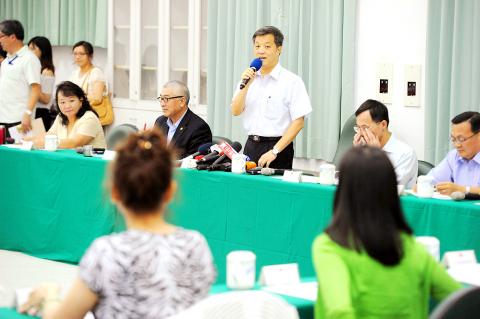The nation’s monthly and hourly minimum wages may increase next year by about 4 percent, a Ministry of Labor committee concluded after a four-hour meeting yesterday.
The committee, presided over by Minister of Labor Chen Hsiung-wen (陳雄文), recommended that the minimum monthly wage be raised by 3.8 percent, or NT$735 per month, to NT$20,008, and that the minimum hourly wage be increased by 4.3 percent to NT$120.
If approved by the Executive Yuan, the wage increases — which would be more than double the government’s forecast of inflation of 1.64 percent this year — are to be implemented in July next year, the committee said.

Photo: CNA
Next year’s potential wage hike would follow a 1.2 percent rise in the minimum wage this year to NT$19,273, which took effect in July, and a 5.5 percent increase in the hourly minimum wage to NT$115, which was implemented in January.
According to the ministry, the proposed wage increase would directly affect 1.5 million Taiwanese and 300,000 foreign workers.
The Taiwan Labour Front yesterday said that the decision by the committee was unacceptable.
Taiwan is continuing on the path of oppressing its workers, the group said.
The fight for basic wages has been going on for at least three decades and the latest proposed increase “is still some way off from the NT$23,745 the group has set as the goal” for workers, Taiwan Labour Front secretary-general Son Yu-liam (孫友聯) said.
Moreover, the committee’s proposal continues to violate Article 7 of the International Covenant on Economic, Social and Cultural Rights and Resolution No. 131 of the International Labor Organization, Son said.
The basic principle of “guaranteeing workers and their ability to provide their families with basic living standards” is what labor rights groups in Taiwan are aiming for, he said.
Son said the group would continue pushing to enact a law on reviewing basic wages to protect workers if the government delays wage adjustments because of pressure from businesses.

A Ministry of Foreign Affairs official yesterday said that a delegation that visited China for an APEC meeting did not receive any kind of treatment that downgraded Taiwan’s sovereignty. Department of International Organizations Director-General Jonathan Sun (孫儉元) said that he and a group of ministry officials visited Shenzhen, China, to attend the APEC Informal Senior Officials’ Meeting last month. The trip went “smoothly and safely” for all Taiwanese delegates, as the Chinese side arranged the trip in accordance with long-standing practices, Sun said at the ministry’s weekly briefing. The Taiwanese group did not encounter any political suppression, he said. Sun made the remarks when

PREPAREDNESS: Given the difficulty of importing ammunition during wartime, the Ministry of National Defense said it would prioritize ‘coproduction’ partnerships A newly formed unit of the Marine Corps tasked with land-based security operations has recently replaced its aging, domestically produced rifles with more advanced, US-made M4A1 rifles, a source said yesterday. The unnamed source familiar with the matter said the First Security Battalion of the Marine Corps’ Air Defense and Base Guard Group has replaced its older T65K2 rifles, which have been in service since the late 1980s, with the newly received M4A1s. The source did not say exactly when the upgrade took place or how many M4A1s were issued to the battalion. The confirmation came after Chinese-language media reported

The Taiwanese passport ranked 33rd in a global listing of passports by convenience this month, rising three places from last month’s ranking, but matching its position in January last year. The Henley Passport Index, an international ranking of passports by the number of designations its holder can travel to without a visa, showed that the Taiwan passport enables holders to travel to 139 countries and territories without a visa. Singapore’s passport was ranked the most powerful with visa-free access to 192 destinations out of 227, according to the index published on Tuesday by UK-based migration investment consultancy firm Henley and Partners. Japan’s and

BROAD AGREEMENT: The two are nearing a trade deal to reduce Taiwan’s tariff to 15% and a commitment for TSMC to build five more fabs, a ‘New York Times’ report said Taiwan and the US have reached a broad consensus on a trade deal, the Executive Yuan’s Office of Trade Negotiations said yesterday, after a report said that Washington is set to reduce Taiwan’s tariff rate to 15 percent. The New York Times on Monday reported that the two nations are nearing a trade deal to reduce Taiwan’s tariff rate to 15 percent and commit Taiwan Semiconductor Manufacturing Co (TSMC, 台積電) to building at least five more facilities in the US. “The agreement, which has been under negotiation for months, is being legally scrubbed and could be announced this month,” the paper said,